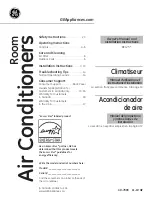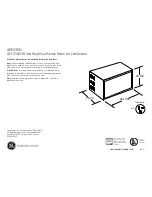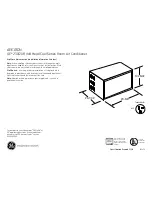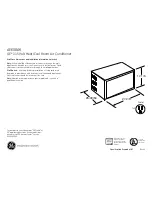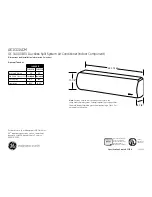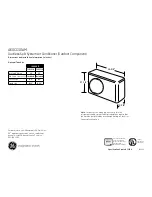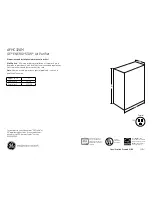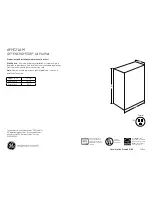
U2
U7
U1
UL
U8
Ud
UF
UP
UH
U6
U3
U4
U5
U9
P1
P2
P9
P4
P5
P6
P8
Indication
Error
Check
code*
Outdoor controller board
Contents
Inspection method
LED1 (Green) LED2 (Red)
3 blinking 1 blinking
2 blinking
3 blinking
* Check code displayed on remote controller
**Refer to service manual for indoor unit.
4 blinking
5 blinking
6 blinking
7 blinking
1 blinking
2 blinking
3 blinking
4 blinking
4 blinking
Abnormality of Discharge
temperature (TH4) and Comp.
surface temperature (TH34)
Abnormality of superheat due
to low discharge temperature
1
Check if stop valves are open.
2
Check if connectors (TH4, TH34, LEV-A, and LEV-B) on outdoor
controller board are not disconnected.
3
Check if unit is filled with specified amount of refrigerant.
4
Measure resistance values among terminals on indoor valve and
outdoor linear expansion valve using a tester.
Abnormal high pressure (High
pressure switch 63H worked.)
Abnormal low pressure (Low
pressure switch 63L worked.)
Abnormality of outdoor fan
motor rotational speed
1
Check if indoor/outdoor units have a short cycle on their air ducts.
2
Check if connector(63H)(63L) on outdoor controller board is not disconnected.
3
Check if heat exchanger and filter is not dirty.
4
Measure resistance values among terminals on linear expansion valve
using a tester.
1
Check if stop valves are open.
2
Check looseness, disconnection, and converse connection of
compressor wiring.
3
Measure resistance values among terminals on compressor using a tester.
4
Check if outdoor unit has a short cycle on its air duct.
Compressor overcurrent
breaking(Start-up locked)
Compressor overcurrent breaking
Abnormality of current sensor (P.B.)
Abnormality of power module
Open/short of discharge
thermistors (TH4) (TH34)
Open/short of outdoor thermistors
(TH3, TH32, TH6, TH7 and TH8)
1
Check if connectors(TH3,TH32,TH34,TH4, and TH7/6)on outdoor
controller board and connector (CN3) on outdoor power board are not
disconnected.
2
Measure resistance value of outdoor thermistors.
Abnormality of heatsink
temperature
1
Check if indoor/outdoor units have a short cycle on their air ducts.
2
Measure resistance value of outdoor thermistor(TH8).
1
Check the outdoor fan motor.
2
Check if connector (TH3) (
T
63HS
) on outdoor controller board is dis-
connected.
Abnormality of voltage
1
Check looseness, disconnection, and converse connection of
compressor wiring.
2
Measure resistance value among terminals on compressor using a tester.
3
Check if power supply voltage decreases.
4
Check the wiring of CN52C.
5
Check the wiring of CNAF.
Abnormality of room temperature thermistor (TH1)
Abnormality of pipe temperature thermistor /Liquid (TH2)
Abnormality of pipe temperature
thermistor/Condenser-Evaporator
1
Check if connectors (CN20, CN21, CN29 and CN44) on indoor
controller board are not disconnected.
2
Measure resistance value of indoor thermistors.
Abnormality of drain sensor (DS)
Float switch connector open (FS)
Indoor drain overflow protection
1
Check if connector (CN31)(CN4F) on indoor controller board is not
disconnected.
2
Measure resistance value of indoor thermistors.
3
Measure resistance value among terminals on drain-up machine using
a tester.
4
Check if drain-up machine works.
5
Check drain function.
Freezing (cooling)/overheating
(heating) protection
1
Check if indoor unit has a short cycle on its air duct.
2
Check if heat exchanger and filter is not dirty.
3
Measure resistance value on indoor and outdoor fan motors.
4
Check if the inside of refrigerant piping is not clogged.
Abnormality of pipe
temperature
1
Check if indoor thermistors(TH2 and TH5) are not disconnected from holder.
2
Check if stop valve is open.
3
Check converse connection of extension pipe. (on plural units connection)
4
Check if indoor/outdoor connecting wire is connected correctly.
(on plural units connection)
P.27
P.29
P.27
P.31
P.29
P.29
P.31
P.29
P.27
P.28
P.28
P.29
**
**
**
**
**
**
Detailed
reference
page
Protection from overheat operation(TH3)(T
63HS
)
P.28
OCH567


































